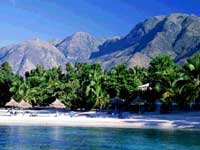Visit worldtravels.com for the full guide to Haiti. Build a complete Haiti travel guide and email to your clients - sign up for a trial subscription of World Travels Pro.
Haiti

Sad to say that when Christopher Columbus first stumbled across the island of Hispaniola in 1492 he little realised that it would become divided into two distinct Republics, half of its lush landscape headed for criminal and political strife. The Republic of Haiti, once known as 'the pearl of the Caribbean', shares this island with the Dominican Republic, but it seems the two countries are worlds apart. One is a tourism magnet, the other largely a pariah where only the brave set foot.
Haiti is a fascinating country, its people friendly and energetic, but a combination of crime, civil disturbance and a mysterious voodoo religion have left most of it high and dry on the world tourism map. It was one of France's richest colonies, but today Haiti languishes as one of the world's poorest nations, its politics descended into chaos, its natural resources plundered, and corruption and crime rife.
Haiti was struck by a catastrophic earthquake in January 2010 that killed nearly 300,000 people and devastated local infrastructure. Many major landmarks in Port-au-Prince were destroyed, including the Presidential Palace, Port-au-Prince Cathedral, and the National Assembly building. Local infrastructure was all but destroyed, and hospitals, communication systems, and transport are basically non-existent. Tourism is discouraged, but intrepid travellers intent on visiting will find many volunteer opportunities in the embattled country.
The fact that dozens of sleek cruise liners still visit a corner of Haiti is proof that there is light in the darkness. The glittering white liners head out from Miami, USA, to disgorge passengers on day visits to the cordoned off port of Labadee, adjacent to Haiti's colourful city of Cap-Haitien, on a bay on the northern coast. Here visitors are assured of their safety as they shop for souvenirs, sample local cuisine and generally enjoy themselves.
Climate
Haiti enjoys a tropical climate and the weather is generally hot and humid, with sultry, warm nights. The rainy season runs from October to May and there are often severe storms during the hurricane season, between June and October, when there is the risk of flooding and hurricanes.
Money
The official currency is the Haitian Gourde (HTG), divided into 100 centimes, but US Dollars are also widely accepted. Credit cards are welcome nearly everywhere, but ATMs are scarce and the few there are in Port au Prince are often out of order. Travellers cheques are difficult to exchange.
Passport Visa
All foreign passengers to Haiti require a valid passport, onward or return tickets, and all necessary travel documentation for their next destination. A yellow fever vaccination certificate is required, if arriving in Haiti within six days of leaving or transiting through an infected area. Yellow fever vaccination certificate exemptions apply to those who did not leave the airport/aircraft when transiting through the infected area. NOTE: It is highly recommended that your passport has at least six months validity remaining after your intended date of departure from your travel destination. Immigration officials often apply different rules to those stated by travel agents and official sources.
Entry Requirements
- US citizens must have a passport that is valid upon arrival in Haiti. A visa is not required for stays of up to three months.
- British citizens must have a passport that is valid upon arrival in Haiti. A visa is not required for stays of up to three months for British passport holders, irrespective of the endorsement regarding their national status contained therein.
- Canadian citizens must have a passport that is valid upon arrival in Haiti. A visa is not required for stays of up to three months.
- Australian citizens must have a passport that is valid upon arrival in Haiti. A visa is not required for stays of up to three months.
- South African citizens must have a passport that is valid upon arrival in Haiti. A visa is not required for stays of up to three months.
- Irish citizens must have a passport that is valid upon arrival in Haiti. A visa is not required for stays of up to three months.
- New Zealand citizens must have a passport that is valid upon arrival in Haiti. A visa is not required for stays of up to three months.
Health
Malaria and dengue fever occur in Haiti and travellers are recommended to take the necessary prophylactics. A yellow fever vaccination certificate is required for those arriving from an infected country in Africa or the Americas, and hepatitis and typhoid vaccinations are also recommended. Medical facilities in Port-au-Prince are of poor quality, and virtually non-existent elsewhere, so medical insurance with evacuation cover is essential, and it is advisable to bring all required medications from home. Visitors should only drink boiled or bottled water and ice should be avoided. It is recommended to avoid buying food or drink from street vendors.
Embassy Consulates
- Embassy of Haiti, Washington DC, United States: +1 202 332 4090.
- Embassy of Haiti, Ottawa, Canada: +1 613 238 1628.
- Embassy of Haiti, Pretoria, South Africa: +27 (0)12 430 7560.
Foreign Embassies
- United States Embassy, Port-au-Prince: +509 2229 8000.
- British Consulate, Port-au-Prince: +509 257 3969.
- Canadian Embassy, Port-au-Prince: +509 249 9000.
- Australian High Commission, Port of Spain, Trinidad and Tobago (also responsible for Haiti): +1 868 822 5450.
- South African High Commission, Kingston, Jamaica (also responsible for Haiti): +1 876 620 4840.







